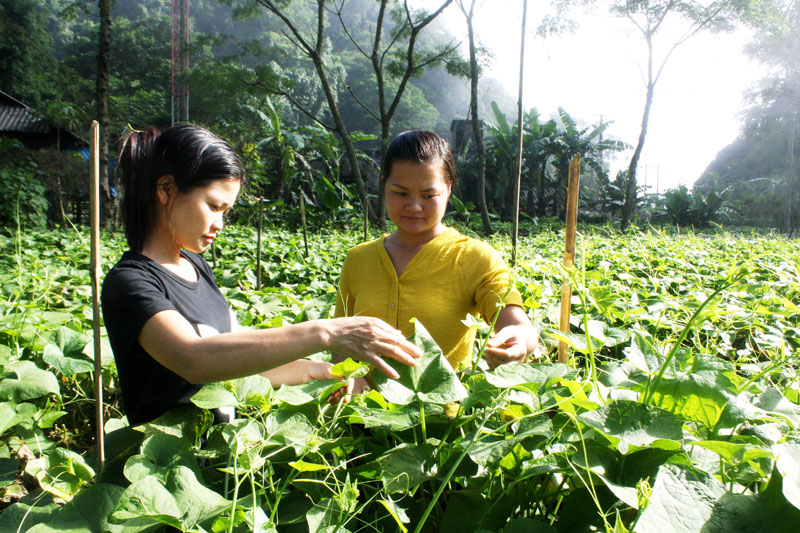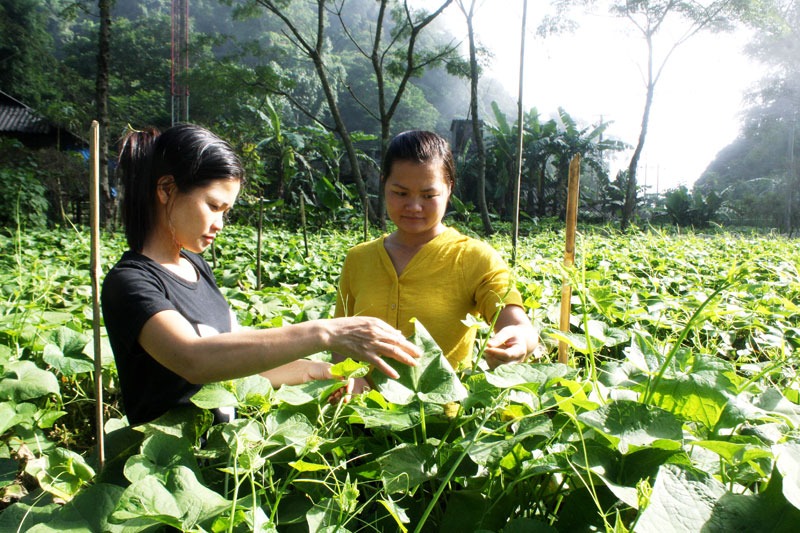
(HBO) - The establishment of the Quyet Chien safe vegetable cooperative has ensured the sale of chayote shoots grown in Quyet Chien commune, Tan Lac district, Bac Giang province, bringing higher income to local farmers here.

The establishment of Quyet
Chien Safe Vegetable Cooperative provides a push for chayote farming in Tan Lac
district and helped solve difficulties in marketing the local vegetable.
Since chayote was introduced in mountainous Tan Lac
district, it has soon become the main crop in local poverty reduction effort.
Quyet Chien has the largest area of under chayote with dozens of hectares
cultivated every year. The local farmers now have more stable source of income
thanks to chayote’s higher productivity than maize and cassava
However, difficulties in selling the vegetable have
hampered the expansion of chayote production in the commune for many years.
Fluctuation in selling prices has made many growers to hesitate to scale up
production.
According to Chairman of the commune’s People’s
Committee Bui Quang Dao, Quyet Chien Cooperative, set up in April 2017, has
fixed the problem. It has not only become the key distributor of local chayote
shoots but also created more competitive pressure on other traders, driving the
price up.
"Over the past few years, farmers have struggled to
bring safely-produced chayote to the market. My family shared the same concern
about how to get access to the traders and the market, with higher prices”, said
the cooperative’s director Dinh Thi Quyet.
"When the new Cooperative Law was launched, receiving
support from other people, I decided to establish the commune’s safe vegetable
cooperative. Now the cooperative has 12 members, most of whom are chayote
growers in Bieng village”, Quyet added.
Quyet shared that the cooperative has faced many
difficulties, particularly in terms of facilities and funding, at the
beginning. Now its operation is on track, purchasing several tonnes of chayote from
local farmers each day, she noted.
The cooperative buys chayote shoots at the price of
6,500 – 7,000 VND per kilo, higher than previous prices set by other traders.
"The cooperative has pressured other traders into
increasing the prices, preventing price squeeze. There is a promising future
for our chayote farming if the cooperative continues to work effective and expand
distribution”, said Bui Thi Tan whose family cultivates over 3,000 sqm of
chayote in Bieng village.
According to data from the Hoa Binh Provincial Party Committee, the industrial production index for the first six months of 2025 is estimated to have increased by 20% compared to the same period last year. This marks the highest year-on-year growth rate for this period since 2020.
In the first six months of 2025, Hoa Binh province’s export turnover was estimated at 1.145 billion USD, marking an 18.11% increase compared to the same period in 2024. Import turnover was estimated at $ 804 million, a 17.15% increase, which helped the province maintain a positive trade balance.
The lives of the ethnic minority farmers in Tan Lac district have gradually improved thanks to the new directions in agricultural production. This is a testament to the collective strength fostered through the professional associations and groups implemented by various levels of the district’s Farmers’ Union.
With the motto the "product quality comes first,” after nearly one year of establishment and operation, Muong village’s Clean Food Agricultural and Commercial Cooperative, located in Cau Hamlet, Hung Son Commune (Kim Boi district), has launched reputable, high-quality agricultural products to the market that are well-received by consumers. The products such as Muong village’s pork sausage, salt-cured chicken, and salt-cured pork hocks have gradually carved out a place in the market and they are on the path to obtaining the OCOP certification.
In the past, the phrase "bumper harvest, rock-bottom prices" was a familiar refrain for Vietnamese farmers engaged in fragmented, small-scale agriculture. But today, a new spirit is emerging across rural areas of Hoa Binh province - one of collaboration, organisation, and collective economic models that provide a stable foundation for production.
Maintaining growing area codes and packing facility codes in accordance with regulations is a mandatory requirement for agricultural products to be eligible for export. Recently, the Department of Agriculture and Environment of Hoa Binh province has intensified technical supervision of designated farming areas and packing facilities to safeguard the "green passport" that enables its products to access international markets.



